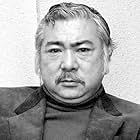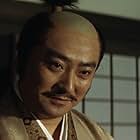Photos
- Director
- Writers
- All cast & crew
- Production, box office & more at IMDbPro
Storyline
Did you know
- ConnectionsFeatured in Best in Action: 1961 (2018)
Featured review
KOJIRO'S TURNING SWALLOW CUT (1961) stars Shintaro Katsu (of Zatoichi fame) as the young swordsman, Kojiro Sasaki, who would go on to gain eternal fame for his 1612 duel with Musashi Miyamoto, a legendary swordfight that has been the subject of countless Japanese movies and TV shows. Since Miyamoto won that duel, far fewer productions have been devoted to his opponent. This is, in fact, only the second film I've ever seen that focuses on Sasaki. (The other is Hiroshi Inagaki's SASAKI KOJIRO, from 1967, a remake of an earlier film by that title by the same director.) Miyamoto is never mentioned in this version, which focuses on incidents early in the young Sasaki's training.
The film sets up an array of fascinating characters, all with different and sometimes conflicting agendas, and has them thrown together by fate, forcing them to work their way through and try to come out unscathed. The key plot thread is Sasaki's insistence on becoming a student of wandering sword master Seigen Toda and the hoops he has to jump through both before and after being accepted. Two women add to the intrigue and complicate things for Sasaki, as does the handsome, stately fiancé of one of the women, one Sir Tamaramaru, a Noh actor with martial arts skills who gets to display both talents in a splendid performance scene. Sasaki and Tamaramaru have philosophical discussions about the way of the sword and weigh the benefits of working for a powerful lord, as Tamaramaru does, versus going one's own way, as Sasaki does. Certain characters are constantly pressured into sword duels with others, which tend not to end well for those doing the pressuring. Sasaki's youthful idealism and romantic notions take quite a few hits in the course of the film, including in his exchange with a geisha who offers up a sharp, sardonic sketch of Tamaramaru's character.
The film is beautifully shot in black-and-white, mostly on location, tightly edited, intelligently written and wonderfully acted by a cast of players who were largely unfamiliar to me, aside from Katsu. This is another one of those undiscovered gems from a forgotten corner of Japanese film history that keep popping up for me in unexpected places. While it's not quite the work of art that YOJIMBO, SAMURAI REBELLION, HARAKIRI, GOYOKIN, or Inagaki's SAMURAI trilogy are considered to be, it is a good melodrama, plunging headfirst into the lives of its characters, keeping us gripped and engaged throughout the concise 80-minute running time. It may not make sweeping statements about the human condition or the Japanese character or social conditions of the time, but it does offer a vivid snapshot of an early step in Sasaki's venture into history and begins to compensate for the less savory portrayals of him seen in so many films about his opponent. It makes me wonder how many more such films about Sasaki exist and are waiting to be found. I've not seen any other films by this director, who made only eleven films per IMDB, this one being the tenth.
The film sets up an array of fascinating characters, all with different and sometimes conflicting agendas, and has them thrown together by fate, forcing them to work their way through and try to come out unscathed. The key plot thread is Sasaki's insistence on becoming a student of wandering sword master Seigen Toda and the hoops he has to jump through both before and after being accepted. Two women add to the intrigue and complicate things for Sasaki, as does the handsome, stately fiancé of one of the women, one Sir Tamaramaru, a Noh actor with martial arts skills who gets to display both talents in a splendid performance scene. Sasaki and Tamaramaru have philosophical discussions about the way of the sword and weigh the benefits of working for a powerful lord, as Tamaramaru does, versus going one's own way, as Sasaki does. Certain characters are constantly pressured into sword duels with others, which tend not to end well for those doing the pressuring. Sasaki's youthful idealism and romantic notions take quite a few hits in the course of the film, including in his exchange with a geisha who offers up a sharp, sardonic sketch of Tamaramaru's character.
The film is beautifully shot in black-and-white, mostly on location, tightly edited, intelligently written and wonderfully acted by a cast of players who were largely unfamiliar to me, aside from Katsu. This is another one of those undiscovered gems from a forgotten corner of Japanese film history that keep popping up for me in unexpected places. While it's not quite the work of art that YOJIMBO, SAMURAI REBELLION, HARAKIRI, GOYOKIN, or Inagaki's SAMURAI trilogy are considered to be, it is a good melodrama, plunging headfirst into the lives of its characters, keeping us gripped and engaged throughout the concise 80-minute running time. It may not make sweeping statements about the human condition or the Japanese character or social conditions of the time, but it does offer a vivid snapshot of an early step in Sasaki's venture into history and begins to compensate for the less savory portrayals of him seen in so many films about his opponent. It makes me wonder how many more such films about Sasaki exist and are waiting to be found. I've not seen any other films by this director, who made only eleven films per IMDB, this one being the tenth.
- BrianDanaCamp
- Apr 19, 2018
- Permalink
Details
- Release date
- Country of origin
- Official site
- Language
- Also known as
- Kojiro's Turning Swallow Cut
- See more company credits at IMDbPro
- Runtime1 hour 20 minutes
- Color
Contribute to this page
Suggest an edit or add missing content




